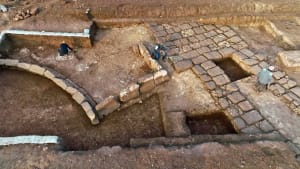Israeli archaeologists uncover artifacts of ancient biblical battle in Megiddo from 7th century BC
Location is the only site in the area mentioned in the both the Bible and all major records of the Ancient Near East

Israeli archaeologists have discovered what they believe constitutes the first archaeological evidence of the epic biblical battle between Judean King Josiah and the Egyptian Pharaoh Necho.
The battle took place in Megiddo in northern Israel during this time period and is mentioned in the Second Book of Kings. It is the same general location as the prophesied battle of Armageddon in the Book of Revelation.
Prof. Israel Finkelstein, head of the School of Archaeology and Maritime Cultures at the University of Haifa and director of the Megiddo Expedition, explained the importance of Megiddo in the ancient Near East.
“Megiddo is the only site in Israel and the neighboring countries mentioned in the Bible and in all great records of the Ancient Near East,” Finkelstein said.
Dr. Assaf Kleiman of Ben Gurion University, a senior member of the Megiddo Expedition staff, placed the archaeological discovery in a biblical context.
“It is important to note that the re-establishment of the site as an Egyptian stronghold in the late 7th century B.C. had long been suspected, mostly based on a biblical verse in the Book of Kings, which described Josiah’s execution at Megiddo by Pharaoh Necho,” Kleiman assessed.
He admitted that the archaeological team was initially surprised by the large quantity of ancient Egyptian pottery in the area.
“Since Egyptian pottery from the Late Iron Age was never encountered before at Megiddo, at the beginning of our research, we were a bit puzzled by the high quantities of crude vessels in the field.”
“However, due to their distinct morphology and the use of straw in the production process of these pots, we suspected an Egyptian origin. Our suspicion was confirmed by petrographic analysis, a method used to locate the production place of ancient artifacts,” Kleiman added.
In addition to the large quantity of ancient Egyptian pottery, the archaeological team also discovered vessels from eastern Greece.
“We know of such mercenaries in the service of Egypt of that time from both Greek and Assyrian textual sources,” Finkelstein revealed.
“There are several clues in the Bible to the participation of Lydians from western Anatolia in the killing of Josiah. One of them is the story of Gog; some scholars think that Gog refers to Gyges, the king of Lydia who, according to the Assyrians, sent mercenaries to serve in the Egyptian army in the 7th century B.C.,” he continued.
Finkelstein further explained the Gog and Magog prophecy, which is mentioned in the New Testament: “The Book of Revelations in the New Testament refers to an eschatological battle between the forces of God and the forces of evil at Armageddon – a corruption in Greek of Har Megiddo – the Mound/hill of Megiddo.”
“Perhaps the theological idea behind it is that a savior from the lineage of David will return in the place where the last and most righteous Davidic King [Josiah] died,” he added.
The leader of the archaeological team revealed that the Megiddo site has been excavated on four separate occasions since the beginning of the 20th century.
“Megiddo has been excavated by four expeditions, starting in the early 20th century,” Finkelstein stated. “Past excavations did not have access to modern methods and techniques and hence many of the results have been contested.”
The Megiddo area is rich in archaeological history. In February 2024, a team led by the Israel Antiquities Authority excavated a Roman legion camp at the foot of Tel Megiddo.

The All Israel News Staff is a team of journalists in Israel.
You might also like to read this:
















